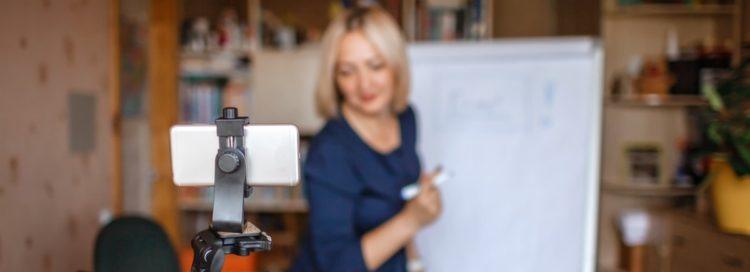Ola Szaran, CMO of financial wellbeing platform Blackbullion, talks about some of the challenges and opportunities she has experienced when shifting the company to a hybrid working culture.
Like many fast growth fintech start-ups, Blackbullion is transitioning to a long-term hybrid workplace.
We’ve always had a flexible culture. As the fintech for education this came into its own in the early days of the pandemic, as we could deliver support seamlessly to our university and college clients.
In many ways, the advent of hybrid working has called for leaders to reset their working cultures. There’s a real opportunity for a culture re-design as we stay true to our commitment to people-first, inclusive and holistic initiatives in this brave new world.
What does this mean for marketing teams, who often come with their own specific brand of team culture? There’s an innate preference for collaborative, hyper-creative and sociable ways of working that runs through every team I’ve worked in. At the same time, marketing teams are a core organisational hub, with relationships touching every part of the business – from product development to investor relationships, as well as the interface with an organisation’s customer community and external audience. With this complex range of constituent audiences, how can you help shape a high-performing marketing team?
Set clear goals
Like many in marketing, we’re working to tight deadlines and big ideas. As a business, we have set quarterly targets and objectives, so everyone’s clear on what’s expected of them. High-performing marketing teams demand clarity. So, we ensure every team member knows what they want to achieve and what that looks like. Goals and timelines are clear and we really encourage our team to align to essential tasks over the nice to have.
When we first went remote in March 2020, we brought in tighter and more regular reporting. This was so teams really knew what they were doing and how they fit into the bigger picture of the Blackbullion vision, since the serendipitous coffee chat was gone. We found this worked well for our business so have kept this as we switch to hybrid working.
We’ve been hiring new marketing colleagues too, and we worked hard to help them settle into the wider team effectively. . We developed workable 90-day plans, to cover introductory periods and getting to know you chats, onboarding onto projects and then ensuring they’re up to speed on delivering on business goals.
Create a culture of ownership
With the multiple stakeholders in marketing teams, it’s essential to identify who’ll be doing what and who owns what part of your plan. We have a strong culture of ownership at Blackbullion, the legacy of growing out of a scrappy startup. You also need to trust your team to make it happen.
The landscape of collaborative tech platforms has shifted so much in the last 18 months. Use these discerningly and transparently to ensure teams are supported and have open lines of communication while home working. We’re huge Trello and Slack fans at Blackbullion.
Over-communicate
There’s a concern that hybrid cultures could potentially create tiers within workplaces, separating those who are in the office more and those who aren’t. We believe there’s no such thing as over-communication and are committed to creating a consistent environment, and employee experience through a mix of virtual, in person and online communications.
We have a series of team meetings across the week, broken down into smaller dedicated project sessions. All meetings are run online, even for those team members in the office. Ensuring inclusion for every team member is a must.
Be open to asynchronous work
Again, this is somewhat of a startup legacy. Our team is super diverse, and everyone has different home priorities alongside work commitments. Our founder Vivi Friedgut is a big believer that the huge post-pandemic reset has shifted our relationship to work for good. It’s about planning your work around your life, rather than the other way around. Self-agency and choice are key for autonomous, effective teams. She’s also super-clear that because she prefers to work later, there’s no expectation of anyone else doing the same.
We make sure all team members have access to meeting information and the freedom to complete tasks on their own schedule. We share meeting agendas so that team members can opt in or out where necessary. We’d rather our team align their energy in a way that works for them rather than rigidly obsessing over 9-5 presenteeism. Catch up after you’ve put the kids to bed. Go for that lunchtime run. And bring your best self to each and every task you do.
Take care of the whole person
By definition, a hybrid workplace needs a meaningful balance between professional and social interplay. Remember Zoom fatigue? The last thing we want is our marketing team to feel disconnected from colleagues or resentful of an overtly transactional process. We take a truly holistic approach to team wellbeing. As things open further, we’ve made time for spontaneous after-work drinks for those in the office as well as scheduled team lunches online, where the company pays for a takeaway.
We wanted to make the office more experiential, too, so the team is inspired to come to it rather than feeling obliged. Thoughtful gatherings, immersive team activities, and team breakfasts are all ways of offering our team an experience they can’t have working at home, if that’s what they’re after.
Leading a super-engaged hybrid marketing team means delivering a consistent employee experience, regardless of being in the office 4 days a week or none at all. It’s about emphasising the daily opportunities for inclusion, contribution and collaboration, creating a safe space for your whole team – whether it’s in the office or an online room – to take your marketing goals forward.

